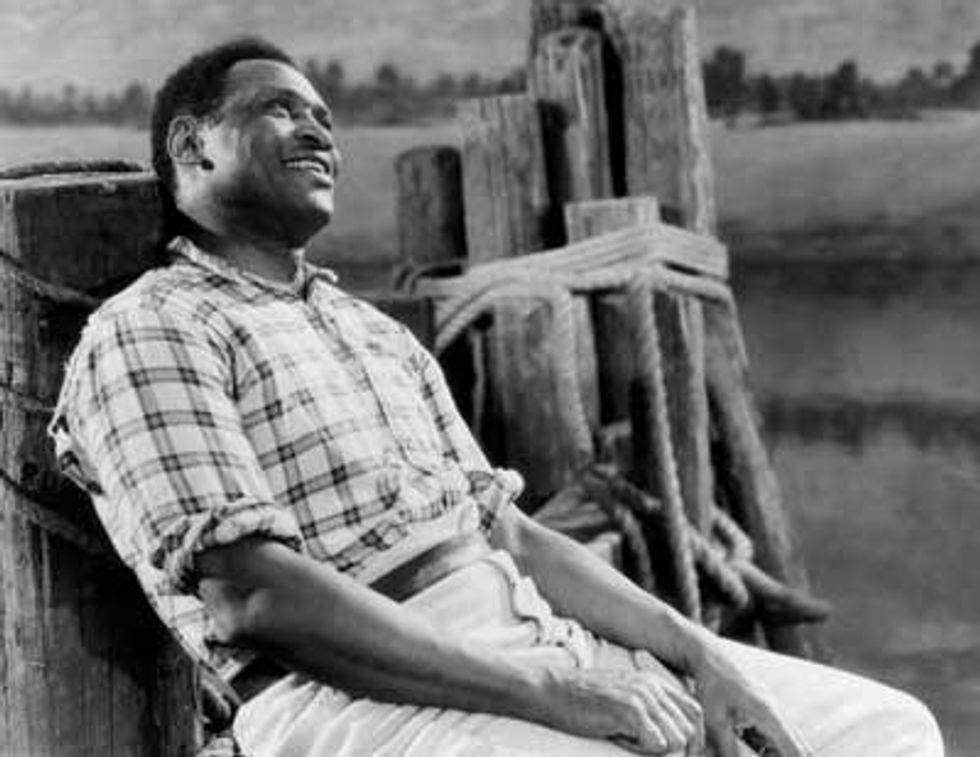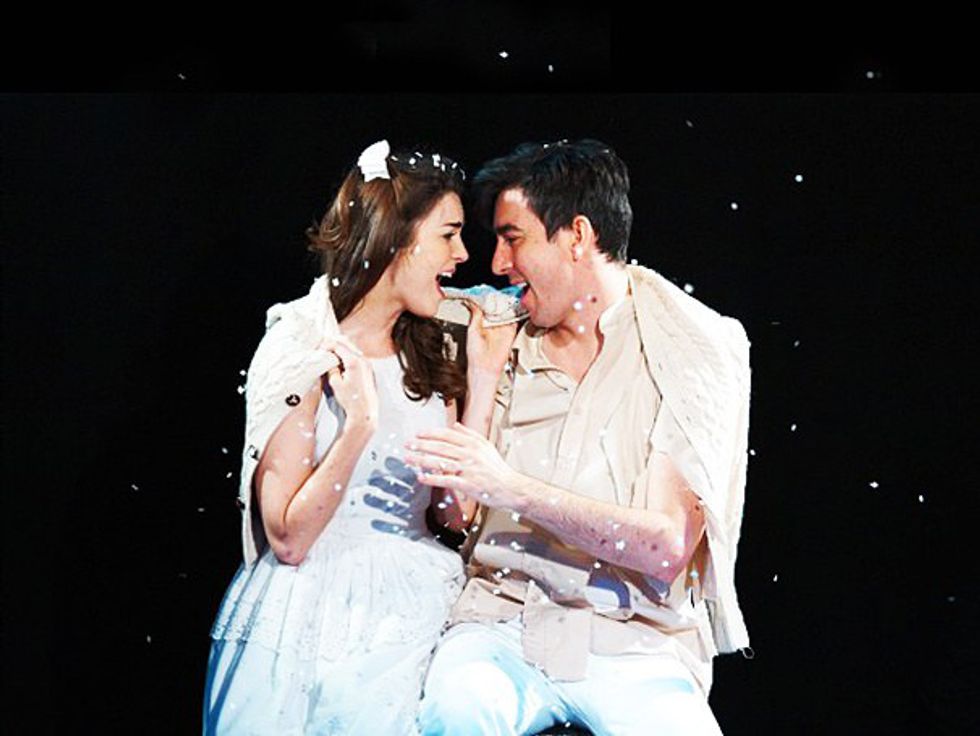When people think "Musical Theater," often corny show tunes and jazz hands come to mind. Yes, many musicals were written for sheer entertainment. But did you know that there have been musicals with real social and political consciences, some of which have caused controversy and have had revolutionary consequences? (We're talking before "Hamilton"...obviously Hamilton counts for this, but you already know that one) So I've compiled a list of 10 of the best and most profound, thought-provoking musicals from the Golden Age of Musical Theater up until the 21st century.
1. Showboat (1927)
With a moving score by Jerome Kern and simply beautiful lyrics by Oscar Hammerstein, Showboat was the first “book musical” ever…meaning before this, all musicals were revues or a themed series of songs and acts. Suddenly, this musical came out and told a story with a beginning, middle, and end. But beyond that, it dealt with civil rights and racial tensions in the Old South: the story follows performers, crew members, and dock workers on a showboat that travels the Mississippi. A revered actress on the boat, Julie, is arrested for misogyny when she is found out to be half black and married to a white man. The opening number shows African-Americans picking cotton alongside the white aristocrats holding parasols singing about the showboat coming to town. The juxtaposition is powerful throughout the show as it spans the 40 years from 1887 to 1927. The tour-de-force "Ol' Man River" is sung by the character Joe, an African-American worker on the boat who sings about how the river sees a lot of injustice, but can't say anything about it and "just keeps rolling along". Powerful stuff (especially for the very first musical).
2. Carousel (1945)
This Rodgers and Hammerstein Golden age classic musical deals with the very difficult subject of domestic abuse. Julie Jordan, the sweet leading lady marries Billy Bigelow, a big guy with a big heart, but who sometimes falls in with the wrong crowd. He becomes abusive and though everyone in town advises Julie to leave him, but she stays. She loves him. A lot of people have a problem with this aspect of the musical, thinking that it has a specific agenda to advise women to stay with their husbands no matter what...but we have to remember the purpose of art is to reflect real life and real people. Whether we agree with it or not, people stay with husbands who abuse them. What I admire about this musical is that despite this, Billy is not painted as a bad guy. We root for the couple when they first meet and fall in love and he tries desperately to overcome his issues. Life is not black and white and the story of these two people is very complex and cannot be easily categorized or solved. The song at the end sung by Julie's Aunt Nettie "You'll Never Walk Alone" sums up what R&H want you to take away from this story.
3. South Pacific (1949)
Once again, Rodgers and Hammerstein tackle deep issues head on with this poignant musical which takes place on a Pacific island during WWII. Nellie, a U.S. Navy nurse, falls in love with a middle-aged French planter, Emile, who calls the island home.When she finds out that he is the father of two mixed-race children, she doesn't take it well. Simultaneously, U.S. Lieutenant Cable falls for a Polynesian woman, Liat. Our two protagonists' true colors are revealed as they struggle with their American pre-conceived notions versus their experiences on the island. Rodgers and Hammerstein faced criticism in 1949 for bringing these themes to the musical stage, particularly for the song "You Have to be Carefully Taught" and its message about how hate and fear are learned. One southern legislator commented: "a song justifying interracial marriage [is] implicitly a threat to the American way of life." Yikes! R & H responded by saying that this song was the whole reason they wrote "South Pacific" in the first place, so they were going to keep the song in the show, even if it meant the whole production might fail. It went on to be one of the most successful and beloved musicals in history.
4. Camelot (1960)
The famous love triangle saga of King Arthur, his queen Guinevere, and his best friend Sir Lancelot has a lot to teach us. First of all, don’t let sexy young Frenchmen into your court (kidding). One main theme in this story is the conflict between strength and justice or as Arthur says "might and right". Another is the idea that no human beings —no matter how good, pure or exalted—are above feeling certain things like lust and love. Arthur wants to scorn his wife for having an affair with his best friend, but it's complicated because they all truly love each other and he maturely asks the question "Can passions be selected?" Everything falls apart when Arthur's bitter, illegitimate son Mordred uses this evidence of the affair to destroy Camelot. This musical based on T. H. White's classic novel "The Once and Future King" teaches us that there is no such place as 'Camelot' where everything is perfect. Fun fact: President John F. Kennedy used to listen to listen to the "Camelot" cast record every night. After his assassination, the musical is what inspired First Lady Jacquelyn Kennedy to coin 'Camelot' to describe her husband's presidency.
5. The Fantasticks (1960)
"The Fantasticks", by Tom Jones and Harvey Schmidt, is the world’s longest running musical and here’s why: it is an endearing, allegorical story with themes and characters which people of all ages can relate to. It's about a boy and a girl who are terribly naïve. Their fathers build a wall between them to get them to fall in love with each other (opposite of "Romeo and Juliet"), and the plan works. The two innocent young lovers are so happy together until they begin to grow up and grow apart: Matt goes off to war and Luisa travels the world and when they come back home broken and battered by the world, they find each other again and this time, their love is real. The show traditionally has a two-piece orchestra, a stark set and a cast of six. The production is small, but the theme of dreamy romance versus love enduring through harsh realities makes the show so real.
6. Sunday in the Park with George (1984)

7. Into the Woods (1987)
God, Sondheim and Lapine were busy in the 80s! This one has a lot of messages…just so many (too many?) messages. That's because it's a musical based on many different fairy tales, the storylines of which are interwoven so that familiar storybook characters interact and help one another on their journey...into the woods. This musical takes our idea of "happily ever after" and deflates it, batters it, punches it to the ground and then kicks it while it's down. The stories are actually a lot closer to the Grimm Brothers fairy tales rather than the Disney-fied versions. It may appear to be a show for kids with characters like Red Riding Hood and Cinderella, but it's better suited for adults. There are some serious nuggets of knowledge packed into this musical in the form of beautiful songs like "Children Will Listen" and "No One is Alone."
8. Passion (1994)
Yet another Sondheim and Lapine production! Adapted from an Italian film by Ettore Scola called "Passione d'Amore" and the novel which that was adapted from called "Fosca", "Passion" tells the story of a soldier (Giorgio) who leaves his beautiful mistress/love (Clara) to go to the front. There he falls in love with his Colonel's cousin, the sickly and ugly Fosca. This musical will leave you with a heartache and several themes to ponder including love, sex, obsession, illness, conventional vs. inner beauty and the shallowness of human beings. Once he has fallen in love with Fosca against his will, Giorgio says to Clara:
"You think that this is love?
Love isn't so convenient.
Love isn't something scheduled in advance,
Not something guaranteed you need
For fear it may pass you by.
You have to take a chance,
You can't just try it out.
What's love unless it's unconditional?"
9. Ragtime (1998)
Based on the 1975 novel by E.L. Doctorow, "Ragtime" tells the story of different groups of immigrants trying to assimilate in the new world (early 20th century America). Stephen Flaherty and Lynn Ahrens wrote an epic score which compliments Terrence McNally's book. We follow the stories of Coalhouse and Sarah, an African-American couple who yearn to give their child the same opportunities that any white child would have; a Latvian immigrant called Tateh who wants the same thing for his daughter; and Mother, the white wife of a wealthy man who helps Sarah with her child and falls in love with Tateh, leaving her close-minded husband in the process. This musical brilliantly tackles racism, prejudices, women's issues and the pursuit of freedom in America. The musical styles of each culture are blended to symbolize the melting pot America was becoming...jazz combined with classical combined with traditional music of Eastern European countries results in...you guessed it...ragtime.
10. The Light in the Piazza (2005)
"The Light in the Piazza" is a contemporary musical by Adam Guettel (the protegé of Stephen Sondheim and the grandson of Richard Rodgers—not a terrible lineage) and Craig Lucas (book). It centers around a young woman named Clara who as her mother puts it is “not what she seems”. Clara, though 26 years old, behaves like a child because of a brain injury she suffered in her youth. Her mother, Margaret takes her to Italy on vacation where Clara falls in love with Fabrizio. The conflict occurs when Margaret is torn between protecting her daughter and letting her be happy. It is a gorgeous play with a lush, sweeping score which really tugs at the heartstrings. Like "Passion", this piece shows us that love is for everyone, regardless of disabilities.






























